by Brian Hioe
語言:
English
Photo Credit: 林昶佐 中正萬華關鍵戰將
ALTHOUGH THE win of the DPP’s Tsai Ing-Wen for the presidential race comes as no surprise, for those who have been paying less attention to Taiwanese politics in the past year, the rise of the New Power Party may come as a surprise. It should not surprise anyone aware of the rise of youth politics in Taiwan, as expressed in the Sunflower Movement and the formation of numerous “Third Force” parties after the movement itself. But somehow, many journalists, and academics writing on Taiwan remain caught within the paradigms of ten years ago and have paid insufficient attention to the development of a vibrant activist youth culture in Taiwan in the last two years.
The New Power Party did not win every race, but most of its most famous candidates won seats in the legislature. This includes Huang Kuo-Chang, former professor of law at Academica Sinica and one of the leaders of the Sunflower movement, longtime activist and heavy metal musician turned politician Freddy Lim, and Hung Tzu-Yung, sister of military cadet Hung Chung-Chiu, whose mysterious death under questionable circumstances during his military service in 2013 sparked massive protests and demands for reform of the military service system. The New Power Party also achieved five percent of the party vote for proportional representation by party in the legislature, allowing for Kawlo Iyun and Hsu Yung-Ming of the New Power Party’s party list to enter legislature, and allowing for a total of five NPP candidates in legislature. In particular, the NPP’s district candidates all ran tough races, defeating several long-established politicians.
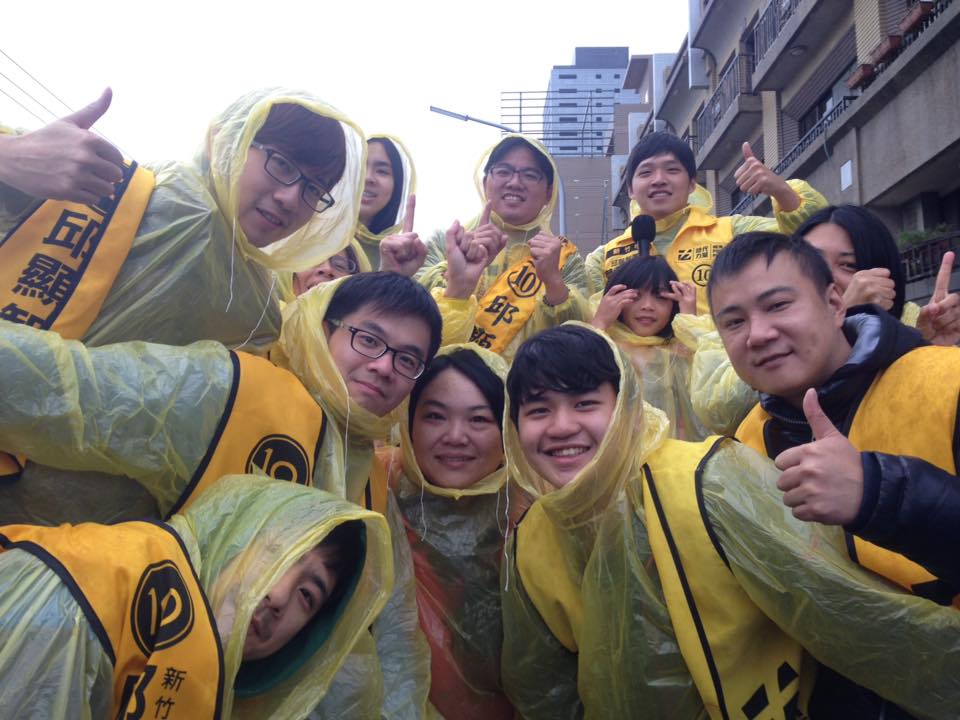 Chiu thanking supporters in the rain the day after elections, despite his loss. Chiu is furthest in the back and in the center, wearing a sash. Photo credit: 邱顯智 為人民辯護
Chiu thanking supporters in the rain the day after elections, despite his loss. Chiu is furthest in the back and in the center, wearing a sash. Photo credit: 邱顯智 為人民辯護
The NPP district candidate who lost was Chiu Hsien-Chih, notable as one of the few if not only Third Force candidate to go directly head to head with the DPP, and whose campaign was managed by Chen Wei-Ting of Sunflower Movement fame. The DPP candidate, Ker Chien-Ming, minority whip of the legislature, was the ultimate winner, though this also reflected a change in Hsinchu from KMT to DPP hands. For the most part, even if Third Force parties differed on their attitudes towards cooperation with the DPP, Third Force candidates sought to convince the DPP to withdraw their candidates from electoral districts in their favor. The Third Force ran in traditionally blue electoral districts so as not to compete with the DPP over the same voter base and attempted to convince the DPP that they might be more successful in these districts than the DPP had in the past.
But of the two major parties which emerged from the Sunflower Movement, the other was the Social Democratic Party, which later joined with the Green Party to form the Green-SDP alliance. There was some contestation between the two parties over which was the proper inheritor to the spirit of the Sunflower Movement. In its beginning, the SDP emphasized a focus on its ideological program of social democracy, placing its program above the fame of individual candidates in putting forth candidates who were not public superstars—as candidates of the New Power Party often were—and refusing to openly cooperate with the DPP even though if it also adopted the strategy shared by Third Force parties of running in traditionally blue districts and seeking to convince the DPP to withdraw in its favor.
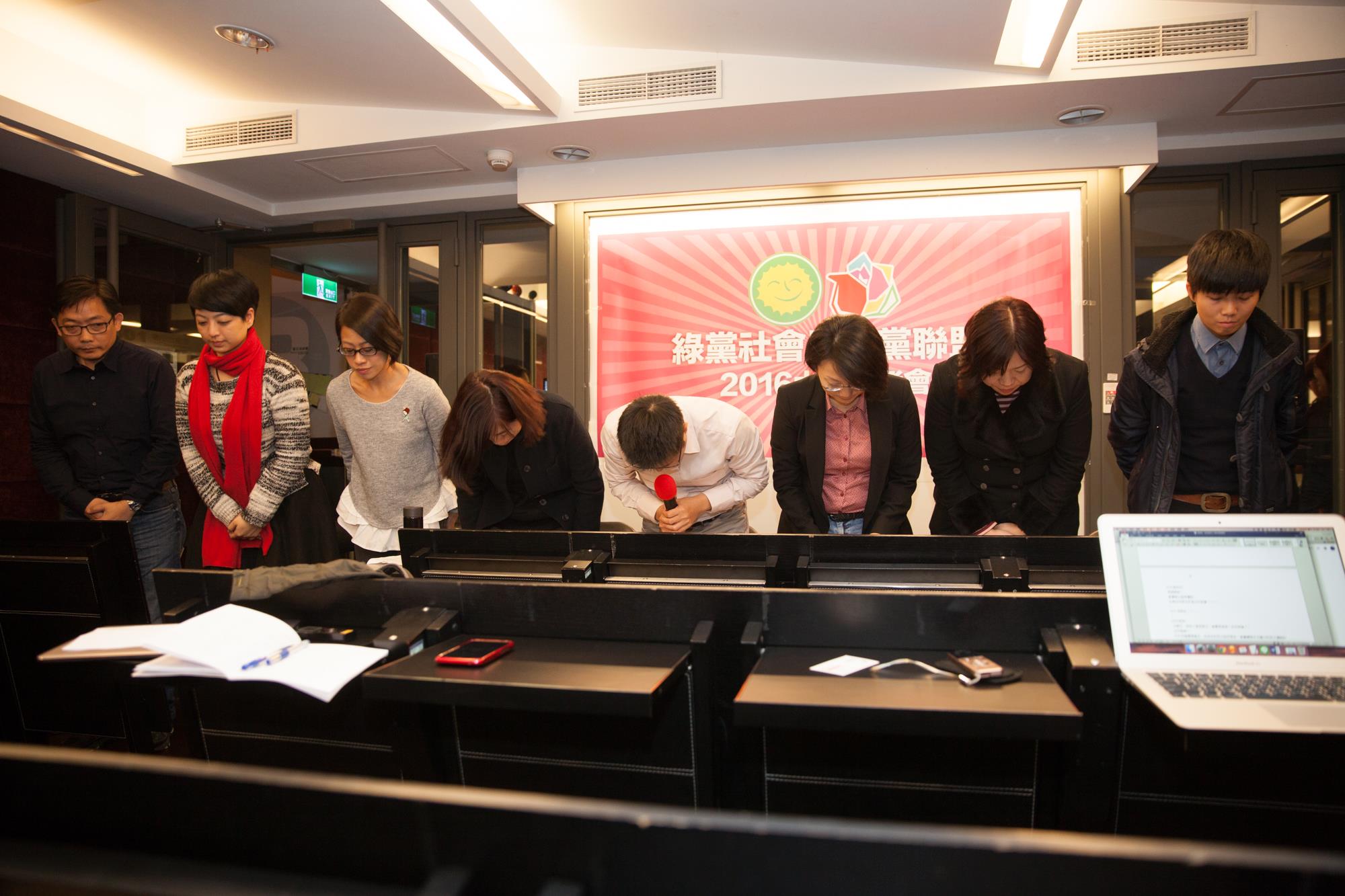 The Greens-SDP Alliance bowing in apology after their defeat. Photo credit: Social Democratic Party
The Greens-SDP Alliance bowing in apology after their defeat. Photo credit: Social Democratic Party
The strategy of the Social Democratic Party backfired. Candidates which originally asserted a refusal to cooperate with the DPP such as party leader Fan Yun were then later seen as hypocritical when they backed down in the face of reality and sought out the DPP’s endorsement, Fan Yun making public appearances with DPP presidential candidate Tsai Ing-Wen and endorsing DPP minority whip Ker Chien-Ming—seen as an especially corrupt member DPP politician—over fellow third force candidate Chiu Hsien-Chih of the New Power Party. Lee Yen-Jong would go so far as to make public appearances with James Soong of the People First Party, a right-wing figure with a criminal past in the martial law period as someone who cracked down on dissent, which was perceived as further betrayal. In general, the SDP was first perceived as elitist in nature on the basis of its initial refusal to employ traditional political advertising methods because of its ideological stances, then as hypocritical after its subsequent backsliding in the face of political reality.
The SDP put none of their district candidates into office and only garnered 2.49% of the party vote, meaning none of their party list candidates will make it into legislature. Following the results of elections, some question as to whether the SDP will survive in the future, although garnering 2.49% of the vote means the SDP does not need to put out ten candidates to get onto the party list anymore and now has tax deductible political donations.
Popular SDP candidates such as Miao Poya may strike out on their own as an independent candidate in the future or just go back to activism. Candidates as Zeng Poyu will return to the Green Party, seeing as the Green Party has a longer history in Taiwan which will let it survive. Actually, reportedly some in the Green Party were chafing at working with the SDP because as a new party which captured popular attention as a party formed after the Sunflower Movement, the SDP seems to have been the dominant force within the alliance between the SDP and the Green Party to form the Green-SDP Alliance. But the backsliding of the SDP from its claimed mission and the general sense that the SDP was running a poorly thought out campaign led to dissatisfaction.
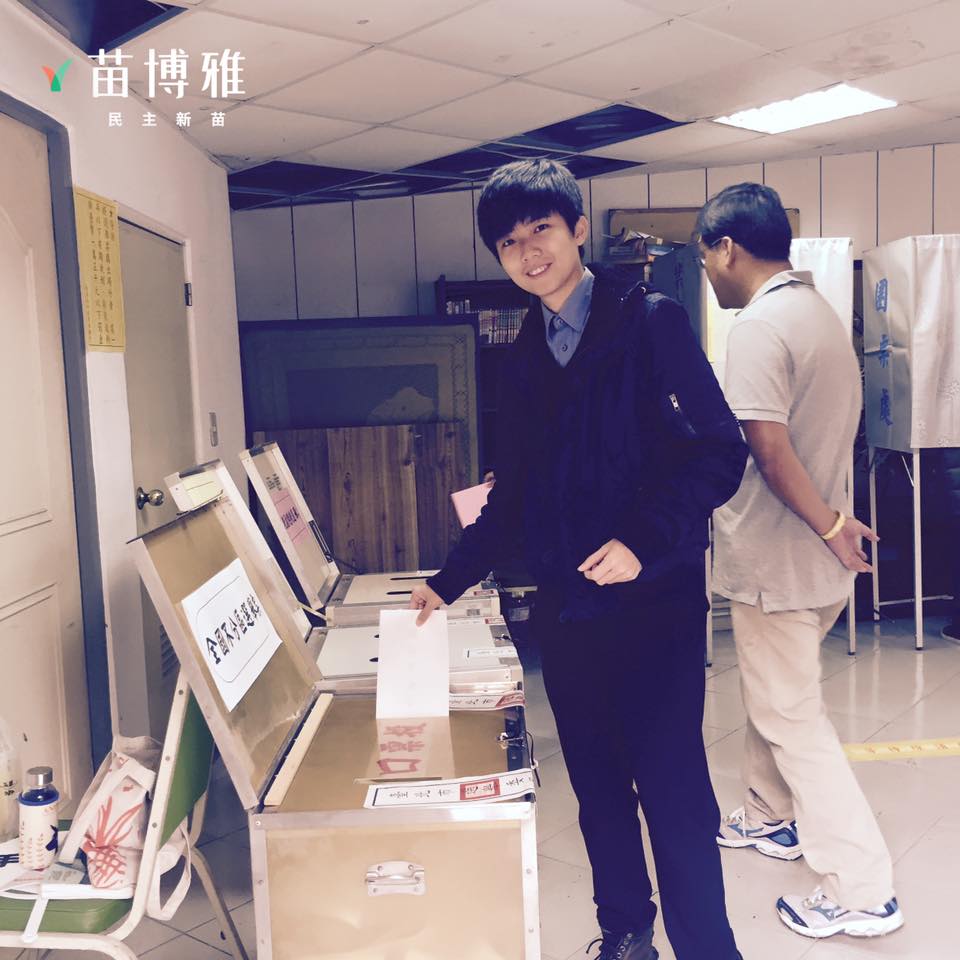 Miao Poya voting on the day of elections. Photo credit: 苗博雅 MiaoPoya
Miao Poya voting on the day of elections. Photo credit: 苗博雅 MiaoPoya
Other Third Force parties did not have any victorious candidates nor make it past the five percent of the party vote needed for proportional representation within the Legislature. Of non-Third Force third parties, the PFP won three seats in legislature on the basis of proportional representation in getting 6.5% of the party vote. In particular, that the PFP still has enough party support to be able accomplish this, despite the overwhelming defeat of James Soong in the presidential election, is surprising but also quite frightening where this means that the PFP will continue to survive as one of the farther right political parties in Taiwan.
The New Party, another ultra-right party whose origins lie in the KMT, also won more than 4% of the party vote, meaning it will have tax deductible political donations, it does not need to put forward ten candidates to get onto the party list vote anymore, and it will receive a 50NTD subsidy for votes it reached in elections for the next four years. This means the New Party will be able to hit the ground running in future elections.
But a notable loser of the election was the Taiwan Solidarity Union, which had only ever had three seats in legislature, yet had played an active role in resisting the KMT’s attempt to unilaterally push pro-China trade deals in the past. Though at the mercy of its spiritual founder, Lee Teng-Hui, who sometimes would unexpectedly turn on it himself, TSU also had an active youth union, if also that the Le Flanc Radical organization which entered into the TSU as a faction was seen as controversial on the basis of its smear attacks conducted on other pro-independence groups and its brand of nationalism which leans towards dangerous forms of ethno-nationalism. The losses of the TSU can largely be accounted to that it was displaced by the NPP, which in some sense ate the TSU’s lunch in front of it by absorbing many of those who would have supported the TSU in the past through the party vote.
It is seen as a shame by activists that the TSU was defeated in present elections by many activists, although it remains to be seen whether the NPP will also take over the function of the TSU in legislature. Probably what will follow is a culling of the Third Force and other third parties, with many not surviving, or merging to form larger groups with a better chance of attaining seats in legislature.
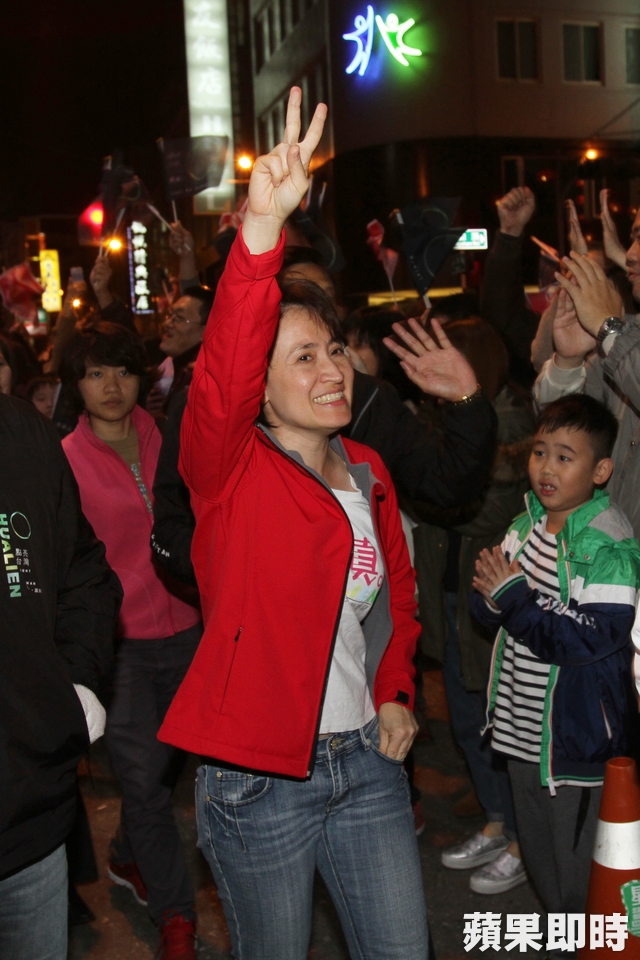 Hsiao Bikhim greeting supporters after victory. Hsiao won by wide margins. Photo credit: Apple Daily
Hsiao Bikhim greeting supporters after victory. Hsiao won by wide margins. Photo credit: Apple Daily
Notable losers include KMT politicians Ting Shou-Chung, who had been in office for some twenty years in Beitou, and former Taipei mayor Hau Lung-Bin. Notable winners outside the Third Force include the DPP’s Hsiao Bikhim in Hualien, former interpreter of Chen Shui-Bian, and the victory of the KMT’s Chiang Wan-An, Chiang Kai-Shek’s grandson, in Zhongshan-Songshan. On outlying islands, despite talk of Kinmen of all places turning green, this did not happen with the victory of Yang Zhenwu of the KMT.
With the DPP taking 68 seats and the KMT only taking 35 seats. Fifty-seven seats are required for a majority in the legislature, which comprises 113 seats, all of which were up at stake in this election. The DPP gained 28 seats to rise to 68 seats from 40 seats before elections and the KMT lost 29 seats from a previous 64 seats. The KMT controls only six of Taiwan’s 22 countries and cities, the DPP now controlling sixteen counties and cities.
This is the first time in history that the DPP has controlled the legislature as a majority, much less that the DPP also holds the presidency. During Chen Shui-Bian’s DPP presidency, the one time a non-KMT president had held the Taiwanese presidency before Tsai’s victory last night, the DPP still did not control the legislature. In particular, as when legislative areas turn from blue to green, they tend to stay green, district election results may reflect more permanent changes in the political geography of Taiwan. Perhaps the DPP will be able to use its majority to push reform measures forward.
But it remains to be seen what the relation of the Third Force and the DPP will be. If past actions of the DPP are any indication, this relation may be fraught. And it is that the Third Force was founded precisely to be a Third Force outside of the DPP or KMT alike in wake of the Sunflower Movement, rather than simply joining the KMT as its youth wing.
During the Chen Shui-Bian administration, DPP politicians took the DPP’s period in power as cue to build local personal networks in the mold of crony capitalism. For example, DPP politicians might collude with corporations to build costly public infrastructure projects at the public’s expense to drive up real estate prices, in return for which, politicians would have a share of corporate profits. Taiwan had no small share of KMT politicians guilty of such corruption and DPP politicians stepped into the footsteps of the KMT during the DPP’s period in power. It is that with the DPP dominant in both the presidency and legislative, DPP politicians may be encouraged to do as they please, where corruption is concerned. And the Third Force is keenly aware of this issue given, for example, the roots of the Third Force going back to actions by Taiwanese civil society against land evictions whether in Dapu, Miaoli or in Shilin or Huaguang Community in Taipei.
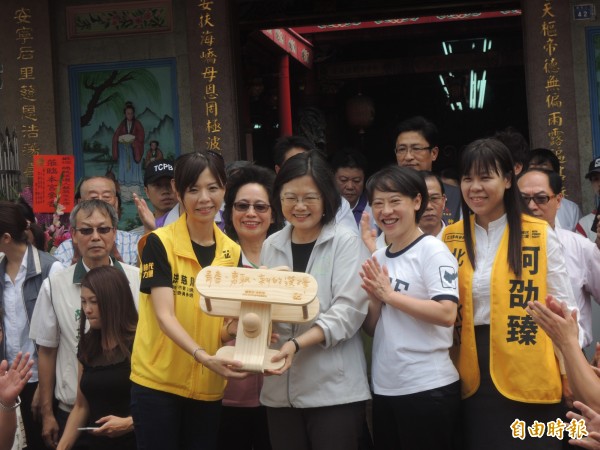 Hung Tzu-Yung (center-left) campaigning with Tsai Ing-Wen (center-right). Photo credit: Liberty Times
Hung Tzu-Yung (center-left) campaigning with Tsai Ing-Wen (center-right). Photo credit: Liberty Times
It is a question as to whether the Third Force would turn on the DPP. The New Power Party, the only successful Third Force party in present elections, is accused by many of having become too close with and indistinguishable from the DPP in order to get its foot into the door of the legislature. Yet, although wishful thinking, it may be that Handy Chiu’s antagonism with to hated DPP figure Ker Chien-Ming will be a better precedent for the relation of the Third Force with the DPP than Freddy Lim, Huang Kuo-Chang, or Hung Tzu-Yung being put into office with not only the DPP withdrawing in their favor, but directly interceding their favor—as we see with Hung Tzu-Yung sharing a campaign office with Tsai Ing-Wen in Taichung and having her campaign managed by Taichung DPP mayor Lin Chia-Lung.
And it may actually be the DPP which becomes antsy about collaboration with the Third Force and prematurely ends cooperation, rather than the other way around. The DPP was happy to work with fresh political faces in the traditionally blue districts it historically could not win, because fresh faces might have a better chance. By supporting newcomers, the DPP could possibly co-opt new talent or at least appeal to young people, in seeming like a progressive party willing to give new participants in politics a shot. As we saw in Tsai’s campaign, the DPP thus spent a great deal of energy in advertising directed at young people, or at least projecting the image that it was a party supported by young people.
But support of the Third Force was only in regards to the district vote. The DPP subsequently became concerned that the Third Force might actually steal away party list seats assigned by proportional representation in the legislature, when it looked as though Third Force parties might get more than five percent of the party vote. Notably, Tsai Ing-Wen herself, who had made more outreach to Taiwanese civil society than anybody during her presidential campaign, during her final campaign rally stressed the importance of voting for the DPP’s party list. Tsai even seemed to try to depict the DPP as having the inherited the spirit of the Sunflower Movement, with reference to young social activists who were members of the party, and leaving out mentioning Third Force parties by name. Of course, it was the protagonists of the Sunflower Movement were largely behind the formation of Third Force parties. And the DPP’s fears proved true, at least in the case of the NPP.
So what, then, will be the actions of the DPP? If under the Chen Shui-Bian administration, corrupt members of the DPP saw it as that they had been given free reign even if the DPP did not control the legislature during this time, will corruption become a problem among the DPP again now that it not only controls the legislature but also the presidency? Tsai herself does not seem to be corrupt, but it seems unlikely she would be able to hold all elements of her party in line.
And it is as a result that we may see renewed conflict between the Third Force, specifically the New Power Party, and the DPP. The NPP may not turn against the DPP if it views its support base as not on steady enough ground to go against the DPP head on.
But if the NPP and other Third Force parties were formed outside of the DPP on the basis of its wariness of the elements of the DPP which are internally corrupt, if the NPP lives up to its originally claimed activist mission, it may turn on the DPP yet. If some international commentators have seen the NPP’s entrance into legislature as another feather in the cap of the DPP’s overwhelming victory this election, with the DPP’s ally party, the NPP, also now being in the legislature, this may actually mark a prelude to conflict between the DPP and NPP. If Tsai Ing-Wen’s policies lurch rightwards or are not sufficiently distinguishable from Ma Ying-Jeou’s, this may be a source of conflict.
But the most pressing source of conflict we see at present may be on the issue of changing the constitution. Changing the constitution had been a demand of civil society for some time. 85 out of 113 legislators are required to vote for constitutional amendments. As the seats controlled by the DPP and NPP do not add up to 85 seats, that the DPP and NPP would need to collaborate on constitutional amendment as well as seek out some KMT legislators to join them.
Yet a goal pushed for by many civil society activists is ridding Taiwan of the Republic of China framework and localizing or rewriting the constitution to move Taiwan away from the constitution the KMT brought with it from China and closer towards a “Republic of Taiwan”. The proposed legal means of realizing this was through a public referendum on a new constitution which is, of course, different from legislators voting for constitutional amendments.
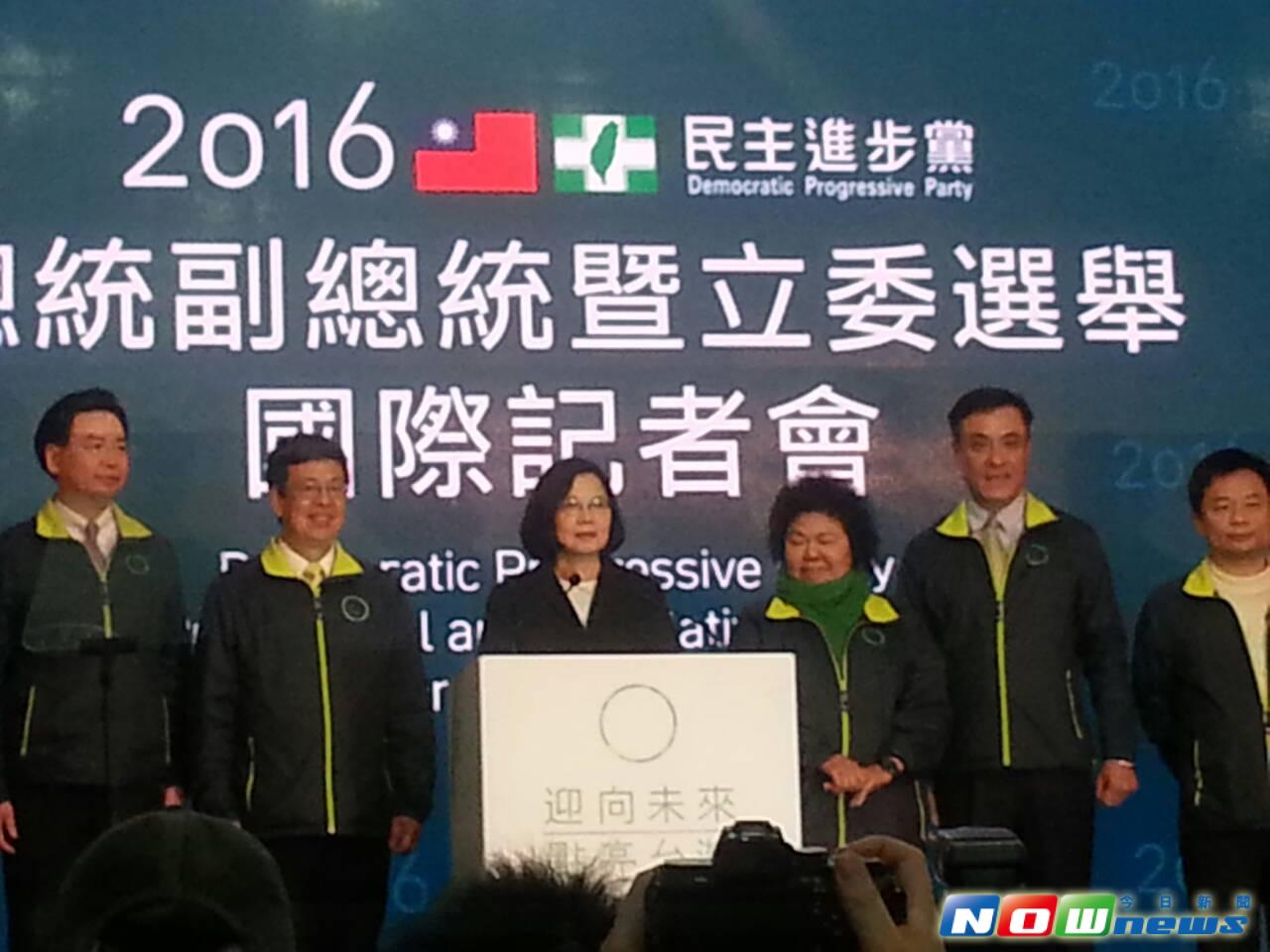 Tsai declaring victory at an international press conference. Note the ROC (left) and DPP (right) flags in the background. Photo credit: NOWNews
Tsai declaring victory at an international press conference. Note the ROC (left) and DPP (right) flags in the background. Photo credit: NOWNews
But Tsai emphasized in her victory speech that she would conduct cross-strait relations under the Republic of China framework and constitution, emphasizing her point by delivering her speech with a backdrop with the DPP flag and ROC flag on it. This was probably directed at those who call for constitutional reform and was a sign that Tsai may not, in fact, support constitutional reform.
Apart from that this probably indicates that Tsai against the idea of throwing out the ROC constitution and rewriting it, Tsai may not in fact agree to an amendment process either, if the issue at stake for being amended may threaten cross-strait relations as it might very well be. Tsai’s view would probably be that keeping the ROC framework is necessary to maintain cross-strait stability with China, as we see in that she had this speech interpreted into English as she delivered it. So the DPP, under Tsai, may not agree to pushing for constitutional amendments, period.
Regardless of whether or not the DPP and NPP will find themselves in conflict in the new future, between this and other issues, we are already seeing splits. Which direction forward for the Third Force, then?


 Chiu thanking supporters in the rain the day after elections, despite his loss. Chiu is furthest in the back and in the center, wearing a sash. Photo credit: 邱顯智 為人民辯護
Chiu thanking supporters in the rain the day after elections, despite his loss. Chiu is furthest in the back and in the center, wearing a sash. Photo credit: 邱顯智 為人民辯護 The Greens-SDP Alliance bowing in apology after their defeat. Photo credit: Social Democratic Party
The Greens-SDP Alliance bowing in apology after their defeat. Photo credit: Social Democratic Party Miao Poya voting on the day of elections. Photo credit: 苗博雅 MiaoPoya
Miao Poya voting on the day of elections. Photo credit: 苗博雅 MiaoPoya Hsiao Bikhim greeting supporters after victory. Hsiao won by wide margins. Photo credit: Apple Daily
Hsiao Bikhim greeting supporters after victory. Hsiao won by wide margins. Photo credit: Apple Daily Hung Tzu-Yung (center-left) campaigning with Tsai Ing-Wen (center-right). Photo credit: Liberty Times
Hung Tzu-Yung (center-left) campaigning with Tsai Ing-Wen (center-right). Photo credit: Liberty Times Tsai declaring victory at an international press conference. Note the ROC (left) and DPP (right) flags in the background. Photo credit: NOWNews
Tsai declaring victory at an international press conference. Note the ROC (left) and DPP (right) flags in the background. Photo credit: NOWNews